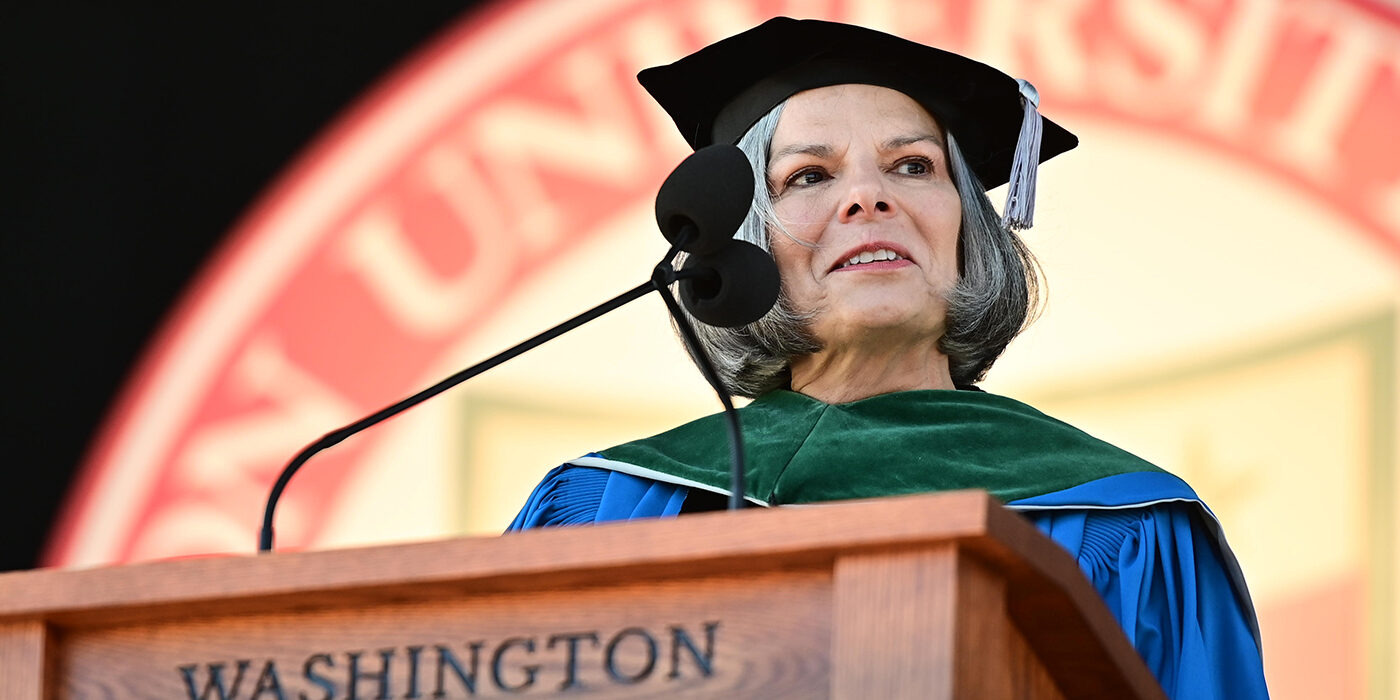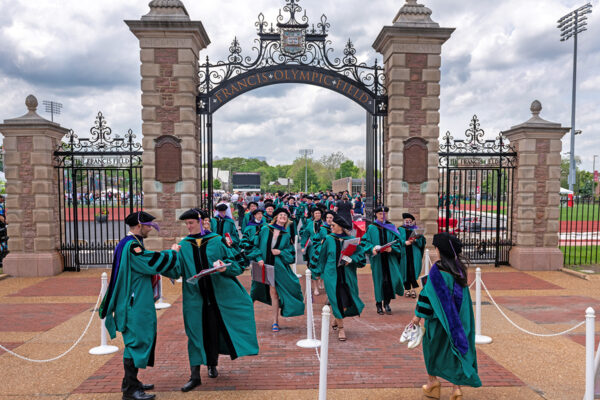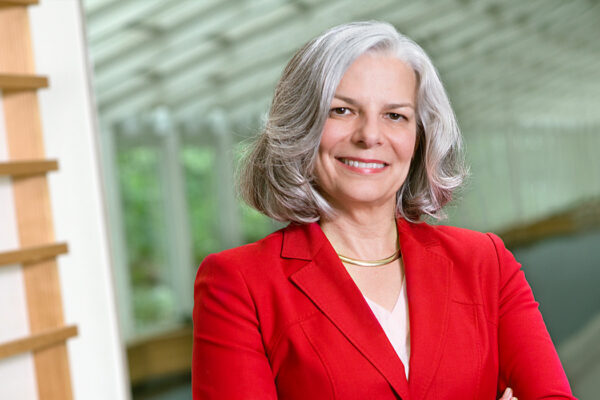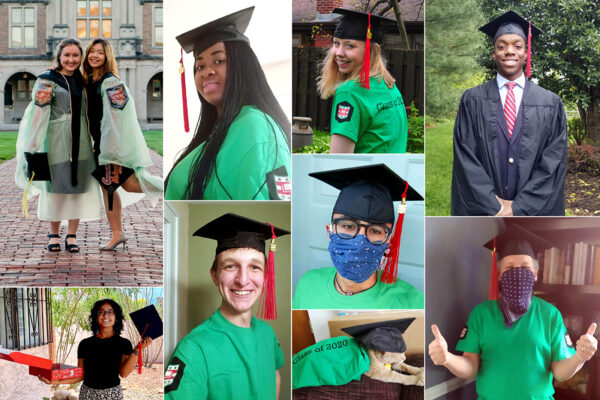“Another better world.”
Three words that Julie L. Gerberding, MD, implored the Washington University in St. Louis Class of 2020 to strive for as they participated — at last — in a Commencement that was nearly 15 months late due to a global pandemic that stopped everything in its tracks.
“We must imagine another better world and then stride boldly through the portal of this pandemic to fight for it,” said Gerberding, the first woman to serve as director of the Centers for Disease Control and Prevention (CDC) and who has spent her entire career at the forefront of infectious disease and public health — including the current fight against COVID-19.
In a most unique and unprecedented day, the university was finally able to celebrate on May 30 its 159th Commencement, nine days after holding its 160th Commencement and 373 days after its originally scheduled date of May 22, 2020.
It was a day to celebrate “academic achievements surpassed only by your resilience,” Gerberding told the more than 1,300 alumni and their families who returned to campus May 30, a beautiful, sunny and cool Memorial Day weekend Sunday. Three ceremonies, two for alumni who earned undergraduate degrees and one for those who earned graduate and professional degrees, allowed the university to safely welcome any members of the class who wanted to return.
“A remarkable tribute to the value you place on your connections to each other, to the faculty and the university,” Gerberding said, smiling each time she looked out over Francis Olympic Field.
“After an incredibly challenging 15 months, welcome home,” Chancellor Andrew D. Martin said, emphatically. In doing so, Martin kept a promise he made to the class in late March 2020, when it became painfully obvious that the pandemic wasn’t going to be under control anytime soon, and he himself made the heartbreaking announcement in a video to the class that the May 2020 Commencement would have to be postponed.
“I won’t sugarcoat it — last March really stunk,” Martin said. “While it was hard on all of us — you, the Class of 2020, truly got the short end of the stick.”
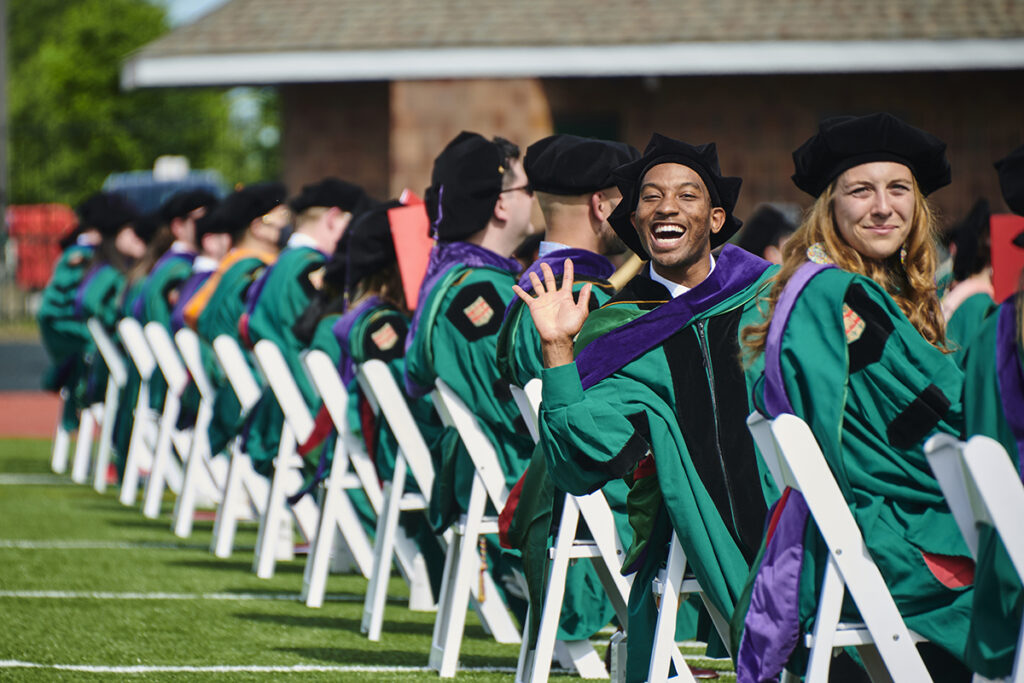
The “Great Pandemic Pivot,” as Gerberding called it. “What had been a predictable rhythm of campus life became a cacophony of directives, disruptions and distractions,” she said.
But surviving it made the Class of 2020 special, Gerberding said, because of the “poignant yet powerful life lessons” the class had learned the past 15 months: The value of time with family and friends; the confidence to adapt to adversity; and the opportunity to be “mindful of your individual and collective vulnerability — as well as the power of the WashU community — the village behind you,” she said.
All enough, Gerberding said, to bestow on the class an extra academic credential: “I believe you all deserve an honorary degree in Pandemic Arts and Sciences for your extraordinary achievements,” she said.
Gerberding recalled her days as a “pioneer of plagues,” her more than 40-year career in infectious disease and public health at the CDC and at Merck, where she now is executive vice president and chief patient officer for the world’s fifth-largest pharmaceutical firm. From the early days of the AIDS pandemic through SARS, avian influenza, West Nile and Ebola, she helped navigate solutions to diseases that had in common the need for effective vaccines and treatments amid tremendous social and geopolitical upheaval.
But none of these challenges, Gerberding said, prepared her for the scale, complexity and impact of the current pandemic, a global battle of epic proportions. “Virus, variants and vulnerability on one side versus vigilance and vaccines on the other,” she said, putting into perspective the significant challenge the Class of 2020 had graduated into.
Quoting Indian human rights/environmental activist and writer Arundhati Roy, she said that the pandemic represented a portal for change, a “gateway between one world and the next,” and that it offered choice to either walk among old and dead ideas of prejudice, hate and avarice, or as she said Roy put it, a chance to “walk through lightly, with little luggage, ready to imagine another world. And ready to fight for it.”
Using that quote as a springboard, Gerberding implored the Class of 2020 to shed the notion of the old “normal.”
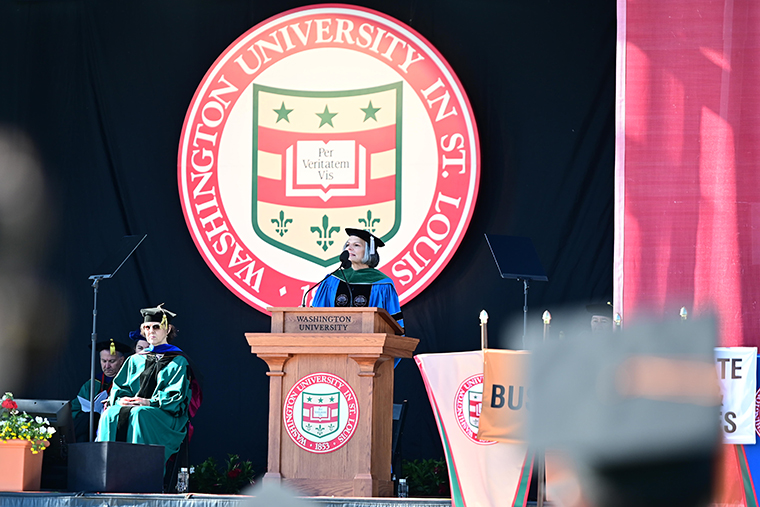
“The old normal was not good enough,” Gerberding said. “Not even close. Not good enough to assure we can be safe in our communities and places of worship. Not good enough to guarantee food security or an affordable quality education for our children. Not good enough to achieve health equity in our country or anywhere else in the world. Not good enough to eliminate structural racism. Not good enough to ensure criminal justice and economic opportunity for all. And certainly not good enough to save our planet.”
Sobering words, but then, looking out on the graduates assembled, she smiled and said that being at WashU on this day brought her great optimism. “I feel like I’m standing on the precipice of hope,” she said, noting than in addition to earning a degree from WashU, the class already had stepped up. But there was more work to be done.
“Each of you is a power of one,” Gerberding said, “capable of deploying your talent and energy to the cause. But collectively, you are a powerhouse for generating ideas and advocacy that will catalyze meaningful change in our world.
“Please fight for that change. Be bold. Persist in pursuing your passion. And above all, cherish the community of friends who brought you back home to WashU today.”
Visit here to read Gerberding’s full speech.
Visit here to read Chancellor Martin’s address to graduates.
Note: A collection of photos from the 2020 Commencement ceremonies is available for viewing and downloading here.
